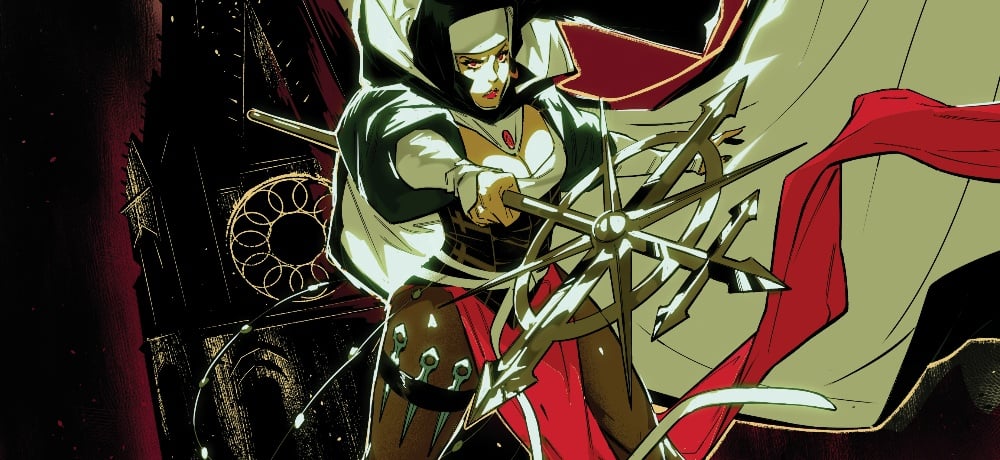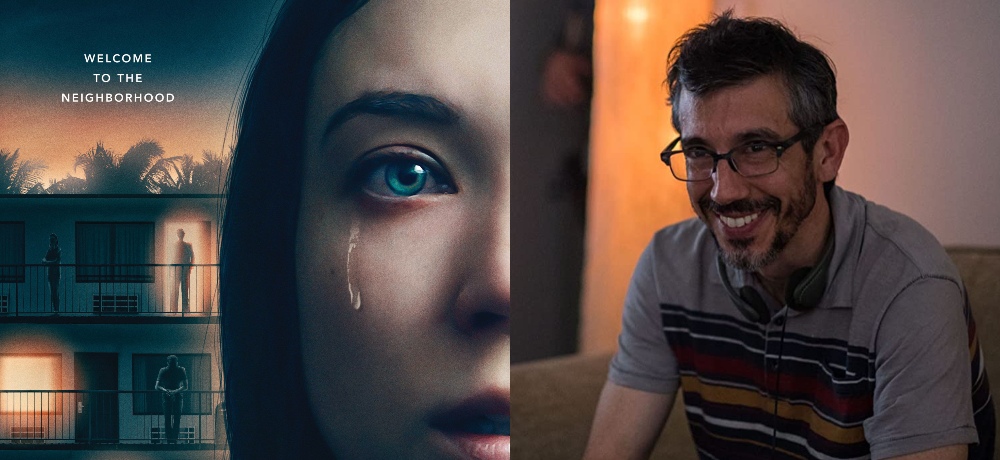






What at first seems like an idyllic Los Angeles apartment becomes a hellish prison for a young woman in the new horror film 1BR. The feature-length debut of writer/director David Marmor, 1BR is out now on digital platforms from Dark Sky Films, and we caught up with Marmor in our latest Q&A feature to discuss the film's timely themes of isolation and longing for community, working with Nicole Brydon Bloom and Naomi Grossman, and what he learned from directing his first feature.
Thanks for taking the time to catch up with us, and congratulations on 1BR! How and when did you come up with the idea for this film?
David Marmor: The idea really started when I moved to Los Angeles in my early 20s and lived in a building a lot like the one in the movie. I would wave to the same neighbors on the breezeways every day without actually knowing anything about any of them, and the whole experience was almost surreal. Those feelings—of alienation, isolation even among all the people in this huge, anonymous city, and longing for some sense of community—formed the seed of 1BR.
How long did it take you to write the screenplay for 1BR, and how many drafts did you go through before finishing the final version?
David Marmor: I’ve lost count of how many drafts I did! 1BR was actually one of the first feature scripts I wrote, and the first draft came together pretty fast (for me), maybe a month or so. I probably went through five or six drafts back then, and then put it on the shelf. Years later, when I signed with my managers, Allard Cantor and Jarrod Murray, they asked what else I could send them. I somewhat reluctantly dusted off 1BR, and to my surprise, they were really excited about it and thought we could get it made. I spent two or three months completely rewriting it, and that’s the version that got into the hands of Alok Mishra and Shane Vorster at Malevolent Films, who took a huge leap of faith on me as a first-time feature director.
The apartment building in this film is like its own character in the movie. Where did filming take place, and how many days did you have in your shooting schedule?
David Marmor: We had 15 days of principal photography, which felt very fast for the scope of the story. Months later, when we had a cut together, we got to do four days of additional photography, which made a huge difference to the finished film.
The Asilo Del Mar exteriors were shot in a real apartment complex in Los Angeles, which was logistically complicated as we had to work around the residents, and it was a real dance figuring out where to stage equipment and so forth. But I loved that location because it felt very much like the place I’d lived years ago. It had this great split personality, with a pool and beautiful trellis courtyard with big trees, but then you’d turn the camera and see three stories of beige breezeways that looked like a prison.
We shot all the apartment interiors on a set. Our production designer, Ricardo Jattan, designed this ingenious apartment set we were able to re-dress to transform it into all four apartments we see in the movie. He and his team were amazing, often working overnight to change the set over so we could keep shooting every morning.
This movie features a great cast, including Nicole Brydon Bloom and Naomi Grossman. What was it like working with them to bring this story to life, and what made them the right fits for their respective roles?
David Marmor: I knew going in that almost the entire weight of the movie would rest on the shoulders of whoever we cast as Sarah, and I can’t overstate how lucky we were to get Nicole. Sarah is a really difficult character, both physically and emotionally. And just to make things even more fun, with our schedule we had almost no rehearsal time and often only had time for a couple takes. I’m honestly not sure we could’ve even finished the movie without Nicole in the role. She so perfectly embodies the character, and is just so smart and surprising in the choices she makes. But she’s also shockingly skilled for someone so young. With such a fast shoot, she had to get to these incredibly intense emotional places very quickly, and she just floored us every time. She’s an absolutely amazing actor and a wonderfully kind and generous person.
And what can I say about directing the force of nature that is Naomi Grossman? Whenever she’s on screen, she’s always fascinating to watch, and she brings this unique sweet/creepy energy to that role. She was so generous to even sign onto our little production, and was so much fun to work with and hang out with. It was a privilege!
Were you influenced or inspired by any other films—horror or otherwise—while making 1BR?
David Marmor: Too many to list! I don’t think it’s possible to make a movie like this without being influenced by Roman Polanski’s apartment trilogy (Repulsion, Rosemary’s Baby, and The Tenant). I was also inspired by Black Swan, which is a masterclass in subjective filmmaking. Everything I do is influenced by Michael Haneke and Stanley Kubrick, and for 1BR I especially studied Caché and A Clockwork Orange. I also stole liberally from Philip Kaufman’s Invasion of the Body Snatchers and [Tobe Hooper's] The Texas Chain Saw Massacre (and probably unconsciously from many others), as well as the paintings of Edward Hopper and Gregory Crewdson’s photography.
1BR touches on relevant topics such as isolation, personal identity, and the rising costs of apartment rentals (particularly in Los Angeles). How important was it for you to weave in that social commentary in 1BR?
David Marmor: For me, an important theme in the movie is the unresolvable tension between being true to oneself and being a good family member, or friend, or citizen. In my own life, those obligations, as important as they are, have at times made me feel trapped in my life, and on some level I think this story has been a kind of extreme exploration of that internal tension. So I guess I wasn’t so much trying to make a social commentary as just working through my personal problems!
Looking back at your time on set, is there a favorite or memorable moment that stands out?
David Marmor: It’s really hard to choose! The whole experience is pretty well seared into my memory, and there were many, many amazing and surprising moments. But if I had to choose one, I think it might have to be shooting the gathering in Miss Stanhope’s apartment. That scene brought together almost the entire cast, so it had a real family feeling to it. It was also one of our last days of shooting, and was in fact the last for Susan Davis, our wonderful Miss Stanhope. So it felt like a real culmination of everything we’d been doing, and a fitting farewell.
If I got to choose a second (sorry to cheat), it’d probably be shooting the early scene of Sarah in the motel room with the cat. We lost our motel location last-minute, and the producers scrambled and found us an actual motel. It was a really seedy place in a seedy part of town, and we didn’t have a permit, so we basically snuck in with a skeleton crew (including the cat and its trainer) and did it guerrilla-style. That was a lot of fun, and felt like being back in film school.
1BR marks your feature-length debut. What did you learn from directing your first film that you’ll apply to your upcoming projects?
David Marmor: Making this movie was an intense education for me and I could write pages about everything I learned, but if I had to choose the most important lesson, I think it was to let go of my inner control freak and focus on creating a positive environment for the cast and crew.
That wasn’t always easy, given the disasters we experienced (including losing three lead actors a couple days before shooting, getting shut down by wildfires, and an equipment truck being stolen in the middle of the night). But in a way I’m grateful for the chaos, because it forced me to learn to put everything else aside, trust the producers to keep us afloat, and just carve out a calm, creative space on set where everyone could do their best work.
I also learned to pace myself. Even a fast feature shoot is a marathon, and it was really important to be disciplined about sleep and finding moments to be alone and quiet so I could stay focused over the entire length of the production.
Ultimately, what do you hope viewers take away from 1BR, especially during these days of social distancing and self-quarantines?
David Marmor: It’s definitely been surreal to have this movie we’ve been working on for years come out in the middle of an unprecedented global emergency. It’s also hard not to see some of the odd parallels: Sarah spends so much of the movie in forced isolation, and the story is very much about the uncomfortable relationship between individuals and the community. Even knowing the movie as well as I do, I’m seeing it a little differently now.
At the same time, my main hopes for the movie haven’t changed. Above anything else, I hope people find it tense and thrilling and entertaining. If it helps them escape the grim headlines for a couple hours (and maybe be grateful they’re not Sarah!), then that’d make me very happy.
What has it been like to team up with Dark Sky Films to release 1BR to the masses?
David Marmor: The whole release process has been so exciting. Just to have a movie I wrote and directed getting a release at all is a lifelong dream come true, and I feel so lucky to be working with Dark Sky. They have a great track record and great taste, so it was an honor to be picked up by them. They’ve really gotten behind the movie and have been so supportive through the whole process. I can’t wait for it to get out there and see how the world responds!
With 1BR now on digital platforms from Dark Sky Films, what other projects do you have coming up that you’re excited about?
David Marmor: I’m getting ready to make my next feature with the 1BR producers Alok Mishra, Shane Vorster, and Sam Sandweiss. It’s a science fiction movie called Invariant that I’ve been working on for years and I couldn’t be more excited to finally have the chance to make it. I don’t think I can say any more about it right now, or Alok might break social distancing to come kill me.